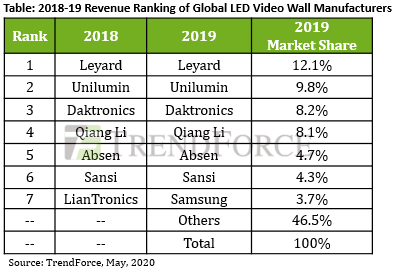According to the latest investigations by the LEDinside research division of TrendForce, owing to the continued shrinking of pixel pitches, LED shipment for video wall is expected to undergo further growth in 2020. Although the current yearly revenue forecast has been revised from the pre-pandemic figure of US$2.261 billion down to US$1.946 billion, it still represents a 3.7% YoY growth.
In terms of the overall LED video wall supply chain, TrendForce indicates that, after the traditional peak seasonality of 4Q19, LED video wall manufacturers had relatively low component inventories in 1Q20. This prompted the manufacturers to aggressively stock up after the Lunar New Year. Therefore, in spite of the COVID-19 pandemic, upstream LED and driver IC suppliers such as Harvatek, Macroblock, and Chipone were able to show strong revenue performances in 1Q20.
In terms of downstream applications, those related to crowd-gathering activities were more heavily affected by the pandemic; such applications include stage rentals, movie cinemas, hotel conference rooms, and retail stores, all of which saw deferred or reduced booking orders. In addition, as COVID-19 began spreading to the European and U.S. markets in April, many LED video wall players’ orders placed by clients from these markets were affected to a high degree as well. The overall market demand in 2Q20 will depend on the progress of pandemic control in the U.S. and Europe. Going forward, national governments are likely to implement various economic stimulus policies throughout 2020 such as increased public infrastructure spending. Subsequently, market demand for LED video walls, including outdoor displays, is likely to ramp up again in 2H20.
While Chinese companies continued to dominate the LED video wall market, Samsung Electronics joined the top seven for the first time in 2019
As reported in TrendForce’s 2020 Global LED Video Wall Market Outlook- Meeting Room, Sales Channel and Price Trend, global LED video wall market revenue reached US$6.3 billion in 2019, an 8.5% increase YoY. The constant expansion of the market brought about a corresponding growth in players’ revenue, specifically in high-end commercial (such as conference rooms) or residential (such as home theaters) applications. Furthermore, as the pixel pitch of LED video walls continues to shrink, many video wall players are gravitating towards releasing products with increasingly fine pixel pitch; for instance, the smallest pixel pitch currently available for mass production is P0.6. TrendForce projects the highest growth in the future LED video wall market to come from P1.2-P1.6 and ultra-fine pitch (P1.1 and under) product segments.

There were no changes in the top six ranking of global LED video wall player revenues from 2018 to 2019. Other than Daktronics as the sole U.S. company, the list consists of Chinese companies only. On the other hand, the recent trend towards ultra-fine pixel pitches has attracted many companies to invest in Mini LED and Micro LED displays. Aside from existing video wall manufacturers, such as Leyard and Unilumin, global companies which predominantly operated in the consumer display sector, such as Samsung, Sony, and LG, are now participating in the LED video wall industry, with each release ultra-fine pitch products under P1.0. This market momentum resulted in Samsung joining the top seven in 2019 for the first time, while the collective market shares of the top seven manufacturers reached approximately 54%.
LEDinside 2020 Global LED Video Wall Market Outlook- Meeting Room, Sales Channel and Price Trend
Release Date: 30 September 2019
Format: PDF
Language: Traditional Chinese / English
Page: 204
|
If you would like to know more details , please contact:
If you would like to know more advertising details , please contact:
|





 CN
TW
EN
CN
TW
EN






